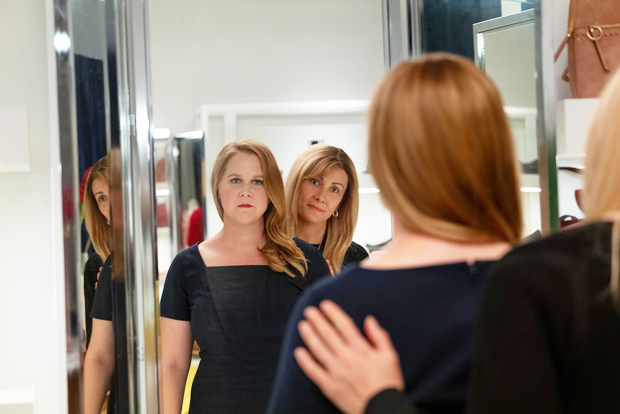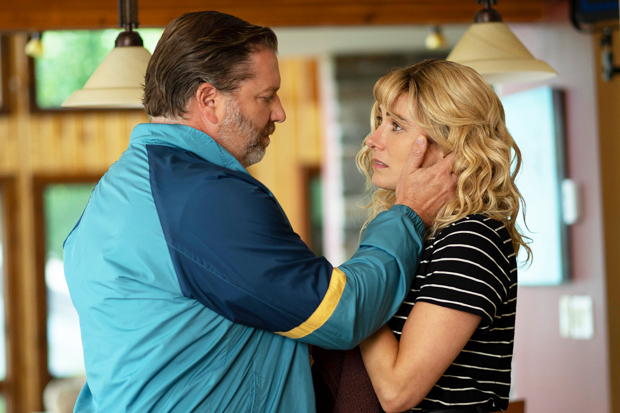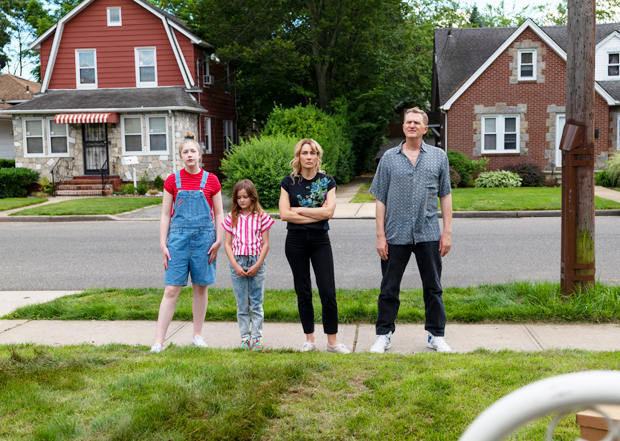Amy Schumer takes us on an emotional journey in Life & Beth. Her character, Beth, goes on an internal and external exploration after the sudden death of her mother, played by Laura Benanti. The Hulu series flashes back to Beth’s childhood, a turbulent time full of change and trauma.
Beth’s mother, Jane, is an undeniable force in Beth’s past. While a flawed woman, Jane went to great lengths to provide for her kids. All of her decisions were rooted in love, whether it be for her kids or a yearning for “love” that would better her life. HollywoodLife spoke EXCLUSIVELY with Laura about Jane’s need for “external validation” and how that impacted her kids, the evolution of motherhood, and more. Read our Q&A below and watch our full interview:

Did Amy come to you about the role of Jane? Was there an audition process? What was that like?
Laura Benanti: Amy and I had done Meteor Shower on Broadway that Steve Martin wrote. It was myself and Keegan-Michael Key and Jeremy Shamos. She and I became friends during that time, so she came to me and asked if I would be interested in playing her mom. And I said, “Of course, yes.”
All of these characters have so many different shades and so many different layers. What was it about Jane that particularly intrigued you?
Laura Benanti: Well, I mean, all of the characters are so nuanced. Jane is the part that I’m right for. So for me, what was interesting to investigate about her is sort of just the way that she moves through the world. I think that she understandably saw the world through the lens of lack. Women only had so many choices, even very recently and still sometimes now. So for her, I think it was like her options were to either get a man to make her life better or suffer. I think she saw it very clearly as that and continued that on throughout her life. So to see how that sort of affects the life of her daughters is, to me, very interesting.
I think about that a lot. As I get older, I think about the things that happened to me as a child. Decisions that were made by my mother or my father, and how they’ve shaped me now. Whether they’re good or bad, most of the time parents do the best that they can. You do have to, as we see Beth do, come to terms with that and understand that in a way that you can’t when you’re young.
Laura Benanti: Parents are people. And when you’re young, you don’t see them as people. You see them as your caretakers and the people who know everything. One of the many things I love so much about this show is the idea, the notion, that we’re all just doing the best that we can. There’s no like mustache-twirling villain. There’s no good guy, bad guy. There’s good people doing questionable things and questionable people doing good things. Everyone’s just trying to move through the world and survive. The thing that I find so beautiful about the show is [that] she takes it beyond surviving, and she ends up thriving in her life and seeing the ways in which her parents loved her despite their foibles.
It all culminates to the very end, that last episode… I haven’t had a monologue or a scene that has affected me as much as the one Amy gives. I could literally cry [thinking about it]. It’s “no one loves you like your mom, and no one hurts you like your mom.” That is just pure brilliance.
Laura Benanti: I have a 5-year-old daughter, and I know that no one will ever love her like me. I know that there will be things as an adult that she holds on to that I didn’t even know I was hurting her. Because I wasn’t able to give her what’s meaningful to her in that moment. Having the grace that Amy has, the generosity to put that on screen, we don’t really ever see that.

She talks about how Jane lived in her daydreams, and that’s how she survived. I love that because I feel like so many moms do that sometimes, and I think that’s it’s a very realistic way of looking at things, especially during the 90s when it was the cusp of the new millennium, but you’re still sort of coming out of the ’80s. It was such a volatile time.
Laura Benanti: Jane was a child of the ’50s. If you think of it that way, the ’50s versus now, fortunately, and for the most part, it’s very different. I think a lot about the types of programming that young women saw, even myself, growing up in the ’80s and the ’90s. I didn’t have Frozen where it’s like sisters. There wasn’t Moana where she’s like saving the world. It was like, be pretty, sing, birds will land on your fingers, and then a prince will save your life.
When I look at this show, it would have been very easy for it to be: Jane is the villain. She caused all this trauma to Beth and her sister, and this is how they’re dealing with it in the present day. But I love that this show explores those finer human elements and, as we’ve talked about, she did the best she can. She has her flaws. But at the end of the day, she loved her kids and did whatever she could to try to make their lives better.
Laura Benanti: And to fill the part of her that felt empty because she didn’t have an internal validation. She needed external validation and, unfortunately, was passing that along to her daughters. I mean, she explicitly says, “If you want a man to pay attention to you, act like you need him.” She is imparting wisdom to them that I’m sure was taught to her or gleaned through her life experience. While that does create trauma and I’m sure behavior that is not ideal, it’s what she had to work with. It’s so clear to me — this is what I love that Amy does — the love is there. Sometimes I think we forget that, and we assume nefarious intent when it’s really just a lack of ability to see beyond one’s limitations.
Do you think she thought she failed her kids at all?
Laura Benanti: I don’t think Jane could allow herself to go there.
That’s another part of being raised in the ’50s and the 60s is you don’t think that way…
Laura Benanti: One of the things she even says about her [Beth’s] sister, “Your sister’s not calling you back, and I’ve done nothing wrong.” That is part of it. What she’s created in Beth is another sort of people pleaser in the beginning and someone who is sort of meek and looking for external validation. In her sister, it’s like a total recluse. She doesn’t want to have anything to do with any human. I don’t think she could see that clearly and not be absolutely crushed.
If she allowed the things that maybe she would have done differently to consume her in a way, it would have just been completely overwhelming for someone like her. Honestly, I hadn’t even watched the trailer when I started watching it, and I just was completely blown away by how we process loss from childhood, and then just the power of love, of unconditional love. It was just so finely tuned. She obviously created, wrote, starred, and then directed 4 episodes. For you, working alongside her in a very intense way, what was that like? I don’t know if this is personal to her at all, but it seemed like this was a very personal story for her at least.
Laura Benanti: I think some of it is based on moments of her childhood. It certainly is fictional. I’m not playing her actual mom, nor is Michael [Rapaport] playing her actual dad, but it is based on some moments in her young life, which I think is incredibly brave of her to put out into the world. Amy is so generous. She’s so loving and warm and helpful and funny and direct. You never have to worry about what does she think. You’ll know, and she’s not going to be a dick about it. She’s clear… I would so much prefer someone lovingly telling me the truth, then sort of passive-aggressively. The environment that she creates, because a set can be a very overwhelming, intense place at times, and the environment that she and everyone created was so loving. I think it allowed the actors to feel safe enough to do some of the really deep exploration that you needed to do in order to adequately portray these people. What I love that she does is she’s so funny, and the show is so funny. But it’s the laughter of recognition and truth. It’s not like a punchline. You’re laughing because you’re like, I’ve felt that way, or I’ve seen someone like that, or I’ve experienced that. The tone is so special.

Everyone looks at motherhood in their own way or tackles it in their own way. Through this role, did it make you think about the experience of being a mother differently?
Laura Benanti: In some ways, it helped me accept that no matter how hard I try — and I really do — there will be things I do inadvertently to hurt my child. Not to hurt my child, but that hurt my child. All I can do is repair when I can. All I can do is apologize if I have behaved in a way that I’m not proud of. I don’t feel like, well, I’m the grown-up and she’s 5 so what I say goes. If I do or say something that I reflect upon, and I’m like, you know what, I could handle that better. I apologize to her. I respect her. I don’t think of her as a little thing that I must tame, or just like a little extension of me. She is her own person living in this world. I think that I was already on that path, but I think that playing this character illuminated that for me even more. I relate to external validation. I think so many women do, which is why this feels so universal. I’m 42 years old, so I grew up in the ’80s and 90s. I was raised by a mother of the ’50s, and she’s an incredible mom. She imparted so much wisdom to me. She grew up with a mother who was born in the ’20s. All of these changing roles, women’s roles, have changed so much in a very brief period of time, and there’s only so much catch-up you can do. So I know that I’m doing my best, and sometimes my best is not good enough. There is an acceptance to that. Not a laziness and not like, well, I tried, but just doing my best to be kind to myself while I navigate raising a human being in this world, which is crazy.
Speaking of other moms, you play Kiki on Gossip Girl. I know that it’s coming back for a second season. Will we see Kiki?
Laura Benanti: We definitely see Kiki again. She’s got a pretty big arc starting around episode 6. You’ll see a lot from her. But you know, it’s the kids’ show. It’s for them.


